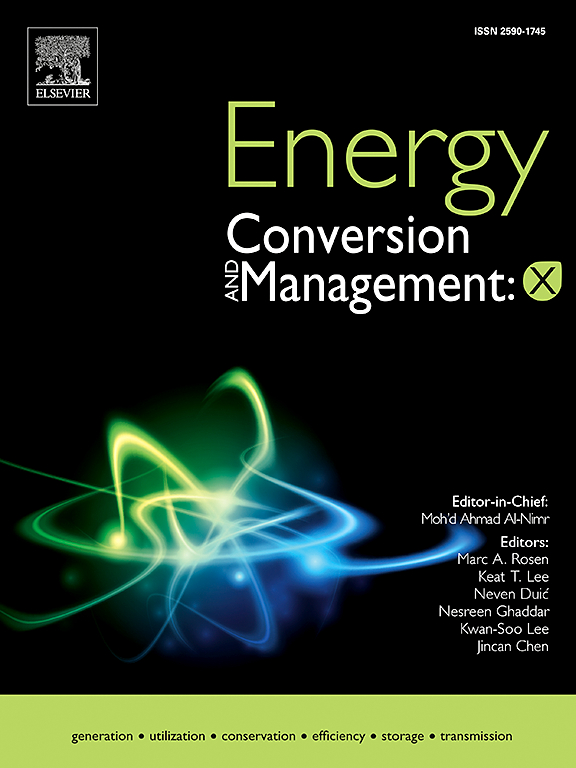Data-Driven Decision-Making for Flexible Natural Gas Allocation Under Uncertainties: An Agent-Based Modelling Approach
IF 7.1
Q1 ENERGY & FUELS
引用次数: 0
Abstract
Despite the anticipated growth in the global demand for energy commodities, the frequently changing market dynamics imposed by environmental regulations and political sanctions create end-user demand uncertainties. This imposes the need for prompt quantitative decision-making approaches to understand how various market structures affect the planning of current natural gas projects. Agent-based modelling (ABM) emerges as a powerful approach to facilitate expedited and well-informed decisions amidst limited timeframes. This study deploys agent-based modelling to investigate natural gas allocation across various utilisation routes under diverse economic and environmental scenarios. Results from four main cases and two sub-scenarios imply that the allocation strategy is driven by utilisation routes considered in each case, followed by the allocation target (i.e., economic or environmental) and the operational bounds. The results reveal that cases prioritising natural gas monetisation for export outperform those meeting power requirements in average annual profitability. In case 4, considering a full network with power, the average annual profitability in the economic scenario reduces by approximately 47% compared to case 3, representing the optimal network configuration with $5.22 billion in average annual profitability. However, the economic scenario of case 3 demonstrates the second-highest rate of emissions (0.66 CO2-eq t/y), following the hydrogen-rich process routes in case 2. Overall, this study presents an innovative data-driven framework for enhancing strategic resource allocation in dynamic business environments. By integrating empirical evidence and technical data with an advanced technical tool (i.e., ABM), the framework provides decision-makers and policymakers with valuable insights for managing uncertainties and shifts in market structures, particularly in existing natural gas projects.
不确定性条件下灵活分配天然气的数据驱动决策:基于代理的建模方法
尽管全球对能源商品的需求预计会有所增长,但环境法规和政治制裁带来的频繁变化的市场动态给最终用户的需求带来了不确定性。这就需要及时采用定量决策方法,以了解各种市场结构如何影响当前天然气项目的规划。基于代理的建模(ABM)是一种强有力的方法,可在有限的时间内快速做出明智的决策。本研究采用基于代理的建模方法,对不同经济和环境情景下各种利用途径的天然气分配进行了研究。四个主要案例和两个子方案的结果表明,每个案例中考虑的利用路线、分配目标(即经济或环境)和运营界限都会对分配策略产生影响。结果表明,优先考虑天然气货币化出口的情况在年平均盈利能力方面优于满足电力需求的情况。在案例 4 中,考虑到全网供电,经济情景下的年平均盈利能力比案例 3 降低了约 47%,代表了年平均盈利能力为 52.2 亿美元的最优网络配置。然而,案例 3 的经济情景显示了第二高的排放率(0.66 吨二氧化碳当量/年),紧随案例 2 的富氢工艺路线。总之,本研究提出了一个创新的数据驱动框架,用于加强动态商业环境中的战略资源分配。通过将经验证据和技术数据与先进的技术工具(即 ABM)相结合,该框架为决策者和政策制定者提供了管理不确定性和市场结构变化的宝贵见解,尤其是在现有的天然气项目中。
本文章由计算机程序翻译,如有差异,请以英文原文为准。
求助全文
约1分钟内获得全文
求助全文
来源期刊

Energy Conversion and Management-X
Multiple-
CiteScore
8.80
自引率
3.20%
发文量
180
审稿时长
58 days
期刊介绍:
Energy Conversion and Management: X is the open access extension of the reputable journal Energy Conversion and Management, serving as a platform for interdisciplinary research on a wide array of critical energy subjects. The journal is dedicated to publishing original contributions and in-depth technical review articles that present groundbreaking research on topics spanning energy generation, utilization, conversion, storage, transmission, conservation, management, and sustainability.
The scope of Energy Conversion and Management: X encompasses various forms of energy, including mechanical, thermal, nuclear, chemical, electromagnetic, magnetic, and electric energy. It addresses all known energy resources, highlighting both conventional sources like fossil fuels and nuclear power, as well as renewable resources such as solar, biomass, hydro, wind, geothermal, and ocean energy.
 求助内容:
求助内容: 应助结果提醒方式:
应助结果提醒方式:


